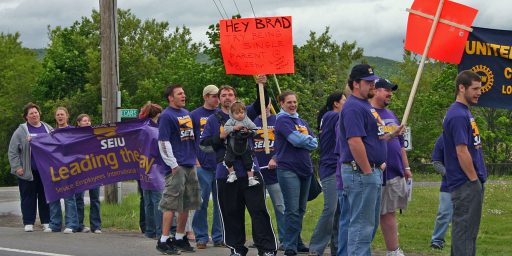Four Unions to Boycott AFL-CIO Meeting
AP: 4 Unions to Boycott AFL-CIO Meeting
CHICAGO – Four major unions decided Sunday to boycott the AFL-CIO convention, setting the stage for one or more to bolt from the 50-year-old federation in a battle over how to reverse organized labor’s decades-long decline, The Associated Press has learned.
The unions, representing about one-third of the AFL-CIO’s 13 million members, planned to announce the decision Sunday afternoon, a day before the convention opens, according to three labor officials familiar with the failed negotiations to avoid the walkout.
None of the four dissident unions planned to formally severe ties from the AFL-CIO on Sunday, officials said, but they are now poised to do so at a later date.
The protest is led by Andy Stern, president of the federation’s largest union, the 1.8 million-member Service Employees International Union. He is virtually certain to pull his union out of the AFL-CIO in coming days, with hopes of bringing his allies along, officials said.
Joining him in the boycott will be the Teamsters, United Food and Commercial Workers and UNITE HERE, a group of textile and hotel workers, according to the labor officials.
The four unions already had formed the Change to Win Coalition to pressure AFL-CIO President John Sweeney to undertake major changes to the federation.
The problem of course is that “major changes” is not defined. I believe strongly in what unions claim as their ultimate goal: pay equity. However, the AFL-CIO leadership is full of anti-corporate Marxists who seem unconcerned with modern economic reality, and whose rhetoric is not in line with that of most Americans. Unless this threatened split from the AFL-CIO is meant to move the organization away from its current dogma, it will only further weaken an already crippled union movement.
“What a divided AFL-CIO would do is signal to opponents of the labor movement that the House of Labor is in disarray and therefore is vulnerable,” said Gary Chaison, industrial relations professor at Clark University in Worcester, Mass.
“Employer opposition to organizing might increase and I think that political opponents might feel emboldened, because they would see it as a sign of weakness.”
Organized labor is nowhere near the political force it once was, so I think its political opponents are already emboldened by dwindling membership and an inability to deliver votes for pro-labor candidates.





